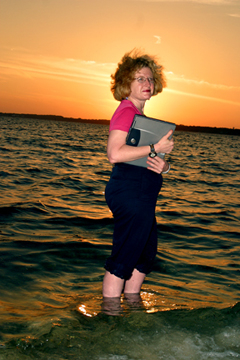Being an engineer requires a steep learning curve and flexibility to combine previous knowledge with current practices and discoveries. And in many cases, it also requires the application of knowledge from several disciplines or concentrations.
Applying background knowledge to solve current problems is a forte of University of Houston graduate Judith Oppenheim (1983 PhD ChE) at Solutia Inc. in Pensacola, Florida, where she serves as a senior research specialist with an emphasis in environmental process technology.
“I used my background in air pollution control to come up with a new gas purification process,” Oppenheim said. “We have an adipic acid plant, and the vent from this process has a lot of Nitrous Oxide. This material is an ozone depleting gas, and as such, is reacted with natural gas to make carbon dioxide, nitrogen, and water. Solutia had developed new process technology so that if they were able to instead purify and recycle this gas, they could make a value added product.”
Given her background in air pollution control, Oppenheim had a full understanding of the problem, but the adipic acid offgas offered some unique challenges.
“Typically, abatement processes are designed to destroy pollutants on the parts per million range in the presence of inerts. In this case, Nitrous Oxide was on the order of 25-45 percent and can be highly reactive,” she said. “What we had to do was remove NOx and VOC's without touching our nitrous oxide supply.”
Deciphering this problem provided a number of obstacles for Oppenheim and her team because of the time constraints. However, she ranks the solution as one of her greatest accomplishments.
“We were in the course of demonstrating the technology in the pilot plant at the same time the engineering for the commercial scale facility was going on, so results from the pilot plant needed to be transferred very quickly to the design team,” Oppenheim said. “When this project was finally implemented, the air quality in the vicinity of the plant improved right away. That’s a tangible benefit, and I had a lot of satisfaction knowing that I played a key role in that.”
Prior to working with Solutia, Oppenheim honed her engineering skills with the Amoco Production Company in Tulsa, Okla., as a senior research engineer. During that time, Oppenheim collaborated with others in the development of reservoir technology such as new oil recovery mechanisms and an all-purpose compositional simulator.
In the late 80s, when oil prices plummeted and companies were looking to improve their product quality as well as and gearing up to comply with the Clean Air Act, Oppenheim moved to Amoco Chemical Company to work in process simulation and air pollution control projects, which proved to be beneficial for her in years to come.
“I started out in oil production work, and things got really slow in that field,” Oppenheim said. “There was no incentive for companies to do oil production research, and they were shifting their resources to other parts of the company. I wanted to have those opportunities, so I moved to the chemical part of the company.”
Then in Naperville, Ill., Oppenheim worked with plant engineers to optimize production without compromising quality or Clean Air Act compliance. Though her work was still engineering-related, the type of work Oppenheim was asked to complete changed.
“My work became a lot more applied,” Oppenheim said. “Rather than developing my own software, I was using off-the-shelf software. It was really an adjustment because I had to learn to channel my creativity from an abstract, theoretical definition of the problem and interpretation of results to a hands-on evaluation of real-time data. Here, I was no longer free to study the problem over the course of a year; I had to have answers by the end of the week.”
While working with Amoco Chemical, Oppenheim had the opportunity to delve into air pollution control and hone her skills in other areas.
“Through the years, I’ve done a lot of projects dealing with environmental remediation and air pollution control, so this is now becoming my area of expertise,” Oppenheim said. “But I get a real sense of satisfaction knowing I can work in either setting. I can see the problem from a lot of different vantage points because of that, and what I like to do is apply what I’ve learned in one area to another area.”
